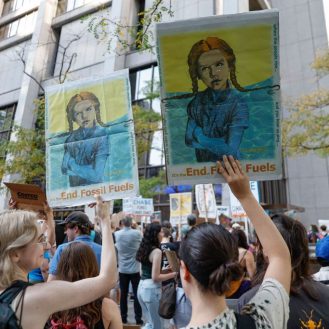Environmental justice and climate activists are suing the Texas government over its plan to expand a section of an interstate highway that runs through the state, saying the project would exacerbate climate change, worsen air quality in neighborhoods already overburdened by industrial pollution and fail to reduce traffic as regulators say it will.
In January the Texas Department of Transportation released an updated version of its $4.9 billion plan to expand a section of I-35 running north to south through the state, from Oklahoma through Waco and Austin to Laredo on the Mexican border.
The plan would add lanes to either side of the highway. Additionally, the city of Austin has its own plan, Our Future 35, to build new pedestrian bridges and “highway caps” across the freeway in a process called “cap and stitch” to reunite east and west Austin, currently divided by I-35.
Highway caps, which are essentially city parks that are built directly over a highway, have become a source of controversy among environmentalists, who see the parks as an attempt by government officials to “greenwash” the pollution problems created by highways.
State transportation officials say expanding I-35 is necessary to decrease traffic congestion and improve safety. But critics say those arguments aren’t supported by evidence.
In June, three Texas nonprofits teamed up to file a civil lawsuit against TxDOT, saying the expansion project would be a waste of public money and “lead to more harm than good” for the communities that live closest to the highway by actually increasing traffic and pollution over time. More traffic would also increase the state’s greenhouse gas emissions, they said.
The groups—Texas Public Interest Research Group, Environment Texas and Rethink35—further allege that by dividing the expansion project into three sub-projects, TxDOT is breaking federal law by avoiding “more rigorous, legally required environmental review and public engagement of a single larger project.” The lawsuit is currently ongoing.
“We owe it to everybody to pass on a planet that people can actually live in,” said Adam Greenfield, director of Rethink35, a grassroots organization formed to oppose the project. “I-35 as it is today, and I-35, an extended version, is fundamentally digging a hole, literally and figuratively committing us to catastrophe.”
A TxDOT spokesperson declined to comment, saying the agency does not discuss pending litigation.
Highway expansions have long been a common practice in the United States. At least 15 states across the country are currently expanding highways that run through them, with at least a dozen more weighing similar proposals.
The projects have also regularly drawn the scorn of community and environmental activists, who say highway expansions often lead to more pollution for low-income families, immigrants and communities of color, which research shows disproportionately live near highways and other major thoroughfares.
That point was reiterated in a September report by the U.S. Public Interest Research Group, a non-partisan national think tank that advocates for public transit. The PIRG report found that at least seven of those highway expansion projects would increase pollution for nearby communities, exacerbate climate change and fail to accomplish their intended purpose—to reduce traffic congestion. Those projects, including the I-35 expansion in Texas, would cost an estimated $22 billion to complete, the report’s authors said, and would waste money better spent on expanding and improving public transportation.
State transportation officials, as well as trade organizations like the American Road and Transportation Builders Association, have long argued that “adding highway capacity is key to helping to reduce traffic congestion.”
Keep Environmental Journalism Alive
ICN provides award-winning climate coverage free of charge and advertising. We rely on donations from readers like you to keep going.
But many studies have shown the opposite, including a study in 2011 and another in 2020 that both showed that highway expansion eventually led to an increase in traffic that outpaced the benefits of building more roads—a term referred to as “induced demand.”
That’s because the building of more roads inevitably leads to more people deciding to drive, said Matt Casale, PIRG’s executive director. When you give people more space to drive, more people end up driving, he said, so “it often does little to reduce congestion and doesn’t really help address our real transportation challenges that we have now.”
In Colorado, where transportation officials spent $1.2 billion to expand I-25 in 2006, activists have complained that the move harmed nearby communities and did nothing to reduce traffic. A 2016 report from the Colorado branch of PIRG, for example, found that congestion on the expanded portion of I-25 returned to pre-construction levels within just five years after completion.
Earlier this year, the Colorado Department of Transportation found itself under fire from activists again after the agency revealed in its 10-year infrastructure plan that it was considering spending as much as $1.5 billion to expand I-25 even further, this time drawing from new federal dollars in the 2021 infrastructure bill.
Environmental and community activists quickly rallied against the proposal, saying it would jeopardize Colorado’s climate goal of slashing state emissions in half by 2030 and would boost pollution from cars and trucks in neighborhoods already overburdened by poor air quality. They also demanded that the money be spent instead on expanding and improving public transit in the region.
Two of the neighborhoods that hug I-25 and would be greatly impacted by its expansion—Sun Valley and Valverde—are predominantly Black and Hispanic, with asthma rates that are more than 250 percent above the state average, according to the Denver Post. In fact, Valverde’s population is more than 80 percent Hispanic, census data shows.
That pressure appeared to work, and in September, the Colorado DOT voted in favor of removing the I-25 expansion proposal from its 10-year plan. Much of that money is now going toward expanding and improving public transit in the area.
“After another summer with dozens of days with unhealthy levels of ozone pollution, Colorado is taking a major step toward a cleaner, safer transportation future,” Danny Katz, executive director of PIRG’s Colorado branch, said after state officials finalized the changes. “I applaud CDOT for shifting transportation spending away from the I-25 central expansion highway widening project and toward healthier, safer ways to get around.”
The victory of activists in Colorado gives Rethink35’s Greenfield hope the group can win its lawsuit in Texas. And while little has developed since June, Greenfield said, he expects the judge to update the parties sometime in the coming months.
While they wait, he said, the Austin activists are continuing to put pressure on state officials and spread public awareness. “If we run some parks on top of an expanded I-35, we are still going to suffer the ravages of climate change,” Greenfield said. “We’re in a climate crisis, what good is it to put some little parks on top?”










